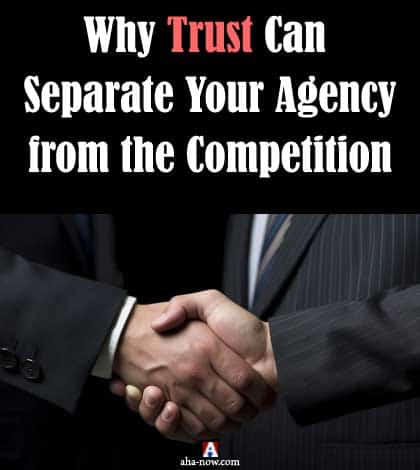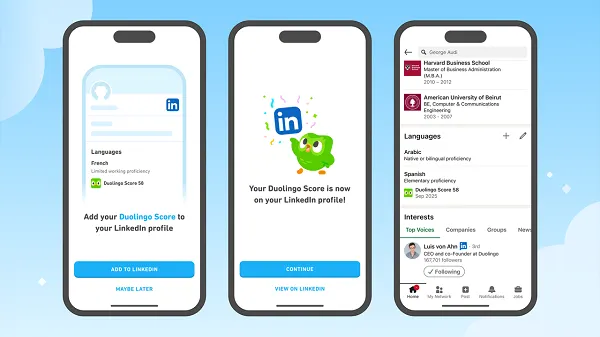Why Trust Can Separate Your Agency from the Competition
To excel as an agency, think from the business point of view. What do businesses want? Trust, communication, and so on. But how do you build that trust?

If you’ve a business, it’s important to spread the word about it. All you need to do is take the help of an agency. But among so many agencies, how do you choose the one that works for you? The answer may help all the agencies out there. Here are some tips that matter for the businesses and agencies as well to stand apart from the crowded marketplace. ~ Ed.

When you’re setting up a new business, you already know you’re going to be at a bit of a disadvantage because no one knows who you are; therefore, they can’t trust you yet. But even for businesses that have been in the game for a little while, this can actually be an issue for them, too. Yes, you read that right! A great example would be those who run an agency. So, nowadays, it seems as if marketing and creativity agencies (and similar) are just popping up more and more.
In a way, it can feel like everyone is offering the same services. It could be something like social media management, graphic design, content marketing, or website development, the market is oversaturated with options. This alone makes it harder and harder for any one agency to stand out. But there’s one powerful way to distinguish your agency from the rest: trust.
Okay, it’s generic, but at the same time it’s true. Generally speaking, trust takes a long time to build up, but whether you’re running an agency or any other business (regardless of niche), it’s going to be the trust that makes you a go-to choice over your competitors.
Trust is About More Than Just Good Results
Sure, delivering good results is important, but trust goes far beyond that. It’s about building a solid relationship with your clients, making them feel valued, and ensuring they believe you have their best interests at heart. In a market where many agencies offer similar services, trust is what will make your clients stick with you rather than jump ship for the next flashy offer.
When clients trust you, they’re more likely to give you repeat business, recommend you to others, and continue to work with your agency even if other agencies come knocking with lower prices.
While everyone loves a good bargain, they can at least know they’re getting their hard-earned money’s worth when working with you. So, it’s essentially creating a foundation of loyalty that’s hard to break.
Why Transparency Matters
One of the biggest ways to build trust is through transparency. Now, that’s simplistic enough, right? Well, clients want to know exactly what they’re getting into when they sign a contract with you. They want to understand your process, what deliverables to expect, how long things will take, and what the costs will be. So that’s why being upfront about all these things shows that you’re not hiding anything and that you’re in it for the long haul.
Besides, a lack of transparency can quickly destroy trust. Just think about it: if a project takes longer than expected or you need to increase the budget, and the client doesn’t find out until the last minute, they’re going to feel blindsided. If you were in their shoes, you wouldn’t be happier about it either, right?
But here’s the thing: if you’re honest from the beginning and communicate any changes as soon as possible, clients will be much more likely to understand and stay with you.
Building Consistency is Key
While yes, by all means, you’re going to need transparency, it’s not only about that either. It’s also about being consistent. When clients see that you consistently deliver on what you promise, they start to trust you more deeply. This means delivering high-quality work on time, keeping communication lines open, and making sure there are no surprises along the way.
Overall, consistency is the backbone of reliability. Clients need to know that they can count on you to get the job done well and without a headache. When they see that you’re dependable time and time again, their trust in your agency grows stronger.
Stay Honest When Things Go Wrong
Okay, so it’s best to just go ahead and face it—things don’t always go as planned. It’s okay, we’re all human. Maybe a deadline is missed, or a project doesn’t turn out the way the client envisioned. But these moments, when things go wrong, are often when trust is built the most. It’s how you handle problems that sets you apart. Again, you’re human, so some mistakes are fine.
So, being honest and upfront when issues arise shows that your agency is trustworthy. Clients respect honesty, and they’re more likely to stick with an agency that owns up to its mistakes and works to make things right. So, trying to cover up mistakes or passing the blame can quickly erode trust, but working together to find a solution shows integrity.
Why Communication is the Foundation of Trust
So earlier, it was mentioned that its hard to break a foundation of loyalty once it was formed. But that’s not the only thing, however. In fact, good communication is at the heart of any strong relationship, and agency-client relationships are no different.
Now, this might be obvious, but you need to communicate with clients properly if you want to build lasting trust. Take the example above: Communicate and stay honest if things are beginning to go wrong. Overall, it’s clear, open, and consistent communication ensures that clients always know where things stand and never feel left in the dark.
Keep Clients Updated Regularly
Again, it’s obvious, but so many agencies (and other businesses) keep getting this wrong! So, one of the simplest ways to build trust through communication is by keeping clients regularly updated.
Even if everything is going smoothly, letting your clients know how things are progressing can go a long way. For example, weekly updates, progress reports, or even a quick email check-in can reassure clients that their project is on track. It doesn’t take long to give updates, and yes, they want to be in the know!
Listening to Client Needs
Well, good communication isn’t just about talking—it’s about listening too. Now, just really taking the time to listen to your client’s needs and concerns shows that you care about their business and are invested in their success, right?
Well, understanding their vision and adapting your strategies to meet their goals can make a huge difference in building trust. They absolutely need to feel heard. So, when they truly do, they’re going to feel like they’re working with a partner, not just a vendor. And that’s the key difference that builds trust.
Setting Clear Expectations
Clients need to know what to expect from the beginning. Believe it or not, so many businesses are guilty of embellishing or even saying what they want their prospective clients to hear in order to get that sale/ contract signed. That’s almost always going to end up bad, very bad!
But when you set realistic expectations and then meet them (or, better yet, exceed them), clients begin to trust that your agency knows how to get the job done. If they can rely on you to deliver exactly what was promised, that trust will continue to grow.
How Trust Helps You Stand Out in a Crowded Market
So, this was mentioned in the intro, but the goal for trust is needed in so many ways, and yes, one of them is to stand out because of the amazing reputation you have (and the loyalty you want to keep acquiring).
While yes, it’s true that many agencies offer the same services, not all can create that deep trust with their clients. Besides, you need to remember that we’re all living in a world where clients have endless options; trust is the one thing that can make your agency irreplaceable.
The Personal Touch Goes a Long Way
One of the best ways to build trust is just by adding a personal touch to your client relationships. So, you’ll need to treat clients as individuals, not just as accounts or contracts. Now, that means you’ll need to take the time to get to know their business, their goals, and even the small things that make them tick. This personal connection shows that you genuinely care about their success, not just the paycheck.
You need to remember that clients want to feel valued, and when they do, they’re much more likely to trust you. Plus, a little extra effort in building those personal relationships can lead to long-term partnerships and glowing referrals.
Trust Turns Clients into Long-Term Partners
So, this was mention a few times already, but this seriously can’t be stressed enough. So, winning over a client is great, but keeping them for the long haul is even better. Essentially, trust is the key to turning one-off projects into ongoing partnerships. When clients know they can rely on you to deliver consistent results and communicate effectively, they’re much more likely to stick around.
Wrapping Up
At the end of the day, you just need to remember that trust isn’t just another box to check—it’s the key to building a thriving agency in a crowded market. Sure, it’ll take some work, but it’s truly worth it. Now, just by focusing on clear communication, consistency, and transparency, your agency can stand out from the competition and build relationships that last. Clients don’t just want results; they want to work with an agency they can rely on, and that’s where trust comes in.
Plus, trust transforms client relationships from transactional to meaningful. It makes your agency more than just another option in the marketplace—it makes you a go-to partner that clients are excited to work with. When trust is at the heart of your agency, long-term success is never far behind.
Over to You
If you have an agency (or any other business), what do you do to help build that foundation of trust? Share your experiences and tips in the comments section to help others!
Disclaimer: Though the views expressed are of the author’s own, this article has been checked for its authenticity of information and resource links provided for a better and deeper understanding of the subject matter. However, you're suggested to make your diligent research and consult subject experts to decide what is best for you. If you spot any factual errors, spelling, or grammatical mistakes in the article, please report at [email protected]. Thanks.

 Konoly
Konoly 
































